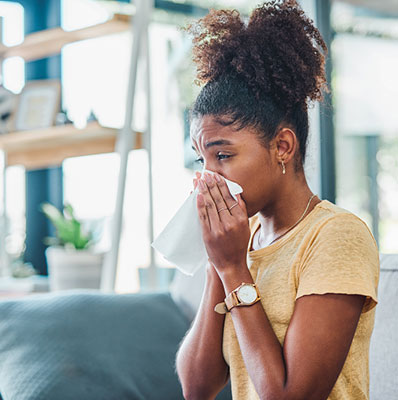Is It the Flu, COVID-19 or Allergies – How Can You Tell?

October 08, 2024
Symptoms of the flu, COVID-19 and allergies can feel similar, so it's important to know the differences to get the appropriate treatment. Here’s an overview of each condition, how to distinguish them and when to seek medical help.
The flu is caused by the Influenza virus (type A or B) and usually comes on suddenly. It's a respiratory illness with symptoms ranging from mild to severe, and it typically peaks in the fall and winter months (typically between October and March in the U.S.).
Caused by the SARS-CoV-2 virus, COVID-19 is a respiratory illness that can cause a wide range of symptoms. While some people experience mild symptoms, others can develop severe illness or complications. It can also spread more easily and quickly than the flu.
Allergies, on the other hand, occur when the immune system reacts to a foreign substance like pollen, pet dander or dust. Unlike the flu or COVID-19, allergies are not caused by a virus and are not contagious. They tend to be seasonal but can also be year-round for some people.
The Similarities:
- Flu and COVID-19: Fever, cough, body aches, fatigue, sore throat, headache
- COVID-19 and allergies: Nasal congestion, runny nose, sore throat
The Differences:
- Flu: Sudden onset, high fever, chills, fatigue; no loss of taste or smell
- COVID-19: Fever, cough, shortness of breath, loss of taste or smell, gastrointestinal symptoms (nausea, vomiting, diarrhea)
- Allergies: Sneezing, itchy eyes, runny/stuffy nose; no fever, body aches or loss of taste/smell
Treatment and When to Seek Medical Attention
For the flu, follow these tips:
- At-home care: Rest, hydration and over-the-counter medications can help alleviate symptoms. Antiviral medications, such as Tamiflu, may be prescribed by a doctor, especially if taken within the first 48 hours of symptom onset or ifyou have an underlying health condition† or take certain medications that put you at high risk.
- When to seek help: See a doctor if you experience difficulty breathing, chest pain, confusion, persistent high fever or if your symptoms worsen after initial improvement. High-risk individuals, including the elderly, those with certain underlying health conditions† and those taking medications that suppress their immunity, should seek medical advice early.
- Prevention: The Centers for Disease Control and Prevention (CDC) recommends the annual flu vaccine, which is effective in preventing severe disease. Please note that the vaccine does not prevent the infection. However, it makes the symptoms less severe and reduces the need for hospitalizations and death. Discuss with your doctor which kind of flu vaccine is best for you.
Follow these suggestions if you have COVID-19:
- At-home care: Mild cases can be managed with rest, fluids and fever-reducing medications. Isolation is crucial to prevent the spread of the virus—the CDC recommends isolating for five days.
- When to seek help: Seek immediate medical attention if you experience trouble breathing, persistent chest pain, confusion or bluish lips or face. High-risk individuals, including the elderly, those with underlying health conditions† and those taking medications that suppress their immunity, should seek medical advice early.
- Prevention: The CDC recommends the COVID-19 vaccine, which is effective in preventing severe disease. Please note that the vaccine does not prevent the infection. However, it makes the symptoms less severe and reduces the need for hospitalizations and death. Discuss with your doctor which kind of COVID-19 vaccine is best for you.
If you have allergies, here’s what you can do:
- At-home care: Over-the-counter antihistamines, decongestants and nasal corticosteroids can alleviate symptoms. Avoiding allergens and using air purifiers can also help. You might also need to stay away from pets, as they might worsen your allergy symptoms.
- When to seek help: If over-the-counter medications are not effective, or if you experience severe reactions like difficulty breathing or swollen tongue, lips or eyelids, seek medical attention. An allergist can provide testing and more targeted treatment.
- Prevention: Avoid allergens and use air purifiers.
Recognizing the differences between the flu, COVID-19 and allergies can help you determine the proper treatment and prevent unnecessary spread, especially in the case of COVID-19. Early identification and the appropriate response can improve outcomes and reduce the risk of complications.
If you are unsure about your symptoms, contacting a health care professional for advice is always a good step.
†Common high-risk conditions include but not limited to: age 65 or older, heart failure (CHF), congenital heart and lung diseases, chronic obstructive pulmonary disease (COPD), asthma, chronic smoking, lung fibrosis, cystic fibrosis, diabetes mellitus (DM) especially if uncontrolled, multiple sclerosis (MS), amyotrophic lateral sclerosis (ALS), dementia, Parkinson's disease, stroke, chronic kidney disease (CKD), chronic liver diseases like cirrhosis, immunocompromised status due to active cancers or being on chemotherapy, or taking transplant medications or glucocorticoids (steroids), immunodeficiencies, HIV/AIDS and others.
Next Steps & Resources:
- To make an appointment with a family medicine doctor near you, call 800-822-8905 or visit our website.
- Learn more about primary care services at Hackensack Meridian Health.
The material provided through HealthU is intended to be used as general information only and should not replace the advice of your physician. Always consult your physician for individual care.






